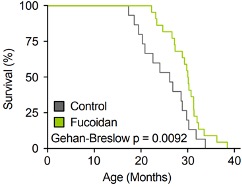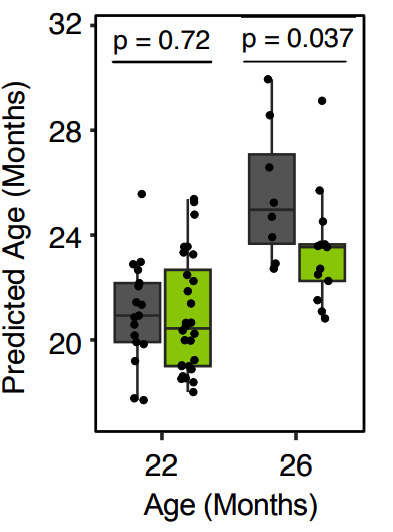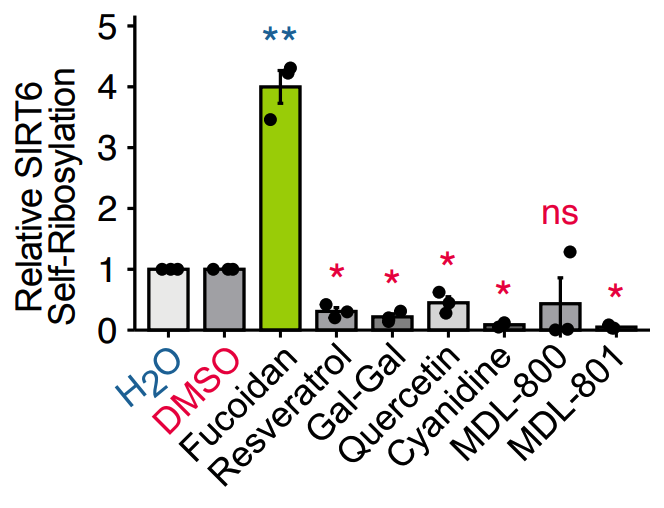Seaweed Molecule Fucoidan Prolongs Life and Benefits Healthy Aging, New Study Shows
Fucoidan activates the longevity-associated enzyme sirtuin 6 (SIRT6), which prolongs the lifespan of mice while improving their health.
Highlights
- Oral supplementation of fucoidan prolongs the lifespan of male mice by 13%.
- Fucoidan also reverses biological aging, as measured by a genetic clock technique.
- Fucoidan deters the gradual age-related decline of health.
Numerous studies suggest that enzymes called sirtuins modulate aging at the cellular level. As such, scientists from the University of Rochester in New York searched for the perfect sirtuin activator in pursuit of inducing longevity and health. Sirtuins can be activated naturally through fasting, but the right sirtuin activator may reap similar benefits to fasting, including prolonged lifespan and reduced disease incidence.
In their new study published as a pre-print, the Rochester scientists report that fucoidan, a molecule found in brown algae seaweed, is a potent sirtuin activator. Moreover, they show that the fucoidan prolongs the lifespan of male mice by 13%. At the same time, like many anti-aging compounds, it was shown that fucoidan did not prolong the lifespan of female mice. Still, these findings reveal that fucoidan is capable of enhancing longevity, particularly in males.

Fucoidan Reverses Biological Aging
A longer life in poor health is undesirable, to say the least. For this reason, geoscientists have tirelessly examined interventions that can promote healthy aging. Healthy aging entails a long life without avoidable age-related chronic conditions, like cardiovascular disease, dementia, and cancer. The risk of these conditions increases not just with chronological age, but also with biological age — a measure of how far our biological machinery has drifted from optimal.
While we cannot control the number of years we have lived, we can modulate how rapidly we age by slowing the gradual biological deterioration of our bodies. One way that scientists quantify biological aging is with “epigenetic clocks,” which can predict the incidence of chronic conditions and mortality. Epigenetics refers to the changes in gene expression that occur due to the coiling and uncoiling of our DNA, rather than the sequence of DNA itself.
As we grow older, the gene expression patterns of our cells are aberrantly altered due to epigenetic changes. These epigenetic changes can be measured with epigenetic clocks, which is what the Rochester scientists, led by Dr. Andrei Seluanov, PhD, and Dr. Vera Gorbunova, PhD, did. They found that fucoidan led to a reduction in biological age for both male and female mice, suggesting the sirtuin activator can reverse biological aging.

Fucoidan Benefits Healthy Aging
Dr. Seluanov, Dr. Gorbunova, and their team assessed the overall health of the fucoidan-fed mice using the frailty index (FI). Frailty, a state of poor health that gradually worsens with age, like epigenetic clocks, can predict mortality. The FI takes into account known indicators of aging, such as high blood pressure and difficulty dressing in humans, or gait in mice. A meta-analysis showed that quality of life is substantially worse for older people living with frailty. With that being said, the researchers found the frailty increased at a slower rate in fucoidan-fed mice, suggesting that fucoidan supplementation benefits healthy aging.
Fucoidan Outperforms Other Longevity-Associated Compounds
There are now a multitude of compounds being tested for their longevity effects in animal models. Many of these compounds can be found in supplement form, but there is little research comparing them against each other. On the more popular side is resveratrol, a plant-based compound found in grapes, and therefore red wine. The hype behind resveratrol stemmed from whether drinking red wine could fight aging. However, at least one study has shown that dietary resveratrol has no effect on longevity, suggesting it needs to be taken in supplement form.
Quercetin, another longevity-associated compound, has gained attention for its senolytic properties. Senolytics are compounds that selectively eliminate senescent cells — cells that accumulate with aging and contribute to chronic low-grade inflammation, which is an underlying biological driver of aging. Quercetin, combined with the pharmaceutical drug dasatinib, has repeatedly been shown to counteract age-related chronic conditions, including cardiovascular disease.
Resveratrol, quercetin, and other compounds previously shown to activate SIRT6 (sirtuin 6), the sirtuin most associated with lifespan extension, were tested against fucoidan. Shockingly, aside from fucoidan, most of the compounds tested reduced sirtuin activity, including resveratrol and quercetin. In contrast, fucoidan increased sirtuin activity nearly 4-fold. In this case, the researchers used their own method for measuring sirtuin activity. Sirtuins trigger epigenetic changes by adding or removing chemical switches. Most researchers measure the degree to which sirtuins remove these switches (deacetylation), whereas the Rochester scientists measured the degree to which sirtuins add these switches, a process called ribosylation. Thus, fucoidan was the only tested compound that increased sirtuin activity via ribosylation.

Combining NAD+ Precursors with Sirtuin Activators
Of the seven sirtuins, SIRT6, an epigenetic modulator involved in DNA repair and metabolism, appears to have the most pro-longevity effects. When SIRT6 is genetically removed from mice, they exhibit drastically shortened lifespans due, in large part, to defects in DNA repair. On the other hand, when SIRT6 is genetically increased in mice, the mice live longer and exhibit an improved metabolism. Moreover, individuals who live beyond the age of 100 have a variant of the SIRT6 gene that increases its ribosylation activity.
All sirtuins, including SIRT6, need NAD+ (nicotinamide adenine dinucleotide) to add or remove the epigenetic switches that modulate cellular aging. Thus, combining a sirtuin activator like fucoidan with an NAD+ precursor like NMN (nicotinamide mononucleotide) could potentially synergistically enhance sirtuin activity. In support of this idea, a previous study showed that the NAD+ precursor NR (nicotinamide riboside) combined with the sirtuin activator pterostilbene reduced liver inflammation in adults, suggesting this combination is not only feasible in humans but may also counteract cellular aging.
Model: 15-month-old C57BL/6JN mice
Dosage: 278 mg/day of fucoidan

